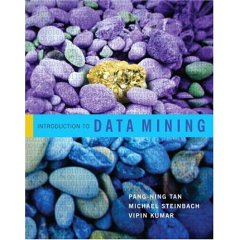
by Pang-Ning Tan and Michael Steinbach and Vipin Kumar
Addison Wesley
ISBN: 0-321-321136-7 769 pages
Published: 2006

by Robert Burke
ESRI Press
ISBN: 9781589480186 436 pages
Published: 2003
| Syllabus | Schedule | FAQ | Assignments | My home page |
| Instructor: | Dr. Wei Ding |
| Office: | S-3-75, Science Building , 3rd floor |
| Email: | ding@cs.umb.edu |
| URL: | http://www.cs.umb.edu/~ding/classes/697/ |
| Class Schedule: | MW 7:00 - 8:15 PM, McCormack M01-0201, McCormack building, 1st floor |
| Office Hours: |
Monday 4:00 PM - 5:15 PM Wednesday 4:00 PM - 5:15 PM |
TEXT BOOK

|
Introduction to Data Mining by Pang-Ning Tan and Michael Steinbach and Vipin Kumar Addison Wesley ISBN: 0-321-321136-7 769 pages Published: 2006 |

|
Getting to Know ArcObjects by Robert Burke ESRI Press ISBN: 9781589480186 436 pages Published: 2003 |
REFERENCE BOOK

|
Spatial Databases: A Tour by Shashi Shekhar and Sanjay Chawla Prentice Hall ISBN: 012-017480-7 262 pages Published: 2003 |
COURSE DESCRIPTION
This course treats a specific advanced topic of current research interest in the area of handling spatial, temporal, and spatio‐temporal data. The main objective of this class is to study research methods in spatial, temporal, and spatio‐temporal datasets. Major topics include data mining and machine learning techniques on clustering, association analysis, and classification. In addition, students will learn how to use popular data mining tools Weka and how to implement ArcGIS applications. The class will expose students to interdisciplinary research on spatial data mining and current practices of industry in handing spatio‐temporal data.
METHODOLOGY
Lecture and interactive problem solving.
APPRAISAL
Participation: 10% of
the total
Individual Homework: 15% of the
total
Term Project: 35% of the total
Examination: 40% of the
total
GRADING
91+ = A; 89+ =
A-;
87+ = B+; 83+ =
B; 80+ = B-;
77+ = C+; 73+ =
C; 70+ = C-;
67+ = D+; 63+ =
D; 60+ = D-;
0+ = F;
READING
We will read from the recommended text book, various sources on the web, and slides that will be made available on the web site. The schedule for the readings are given on the schedule web page.
OTHER POLICIES
Subject: CS697 A question on spatial association rules.
© Wei Ding, 2009, all rights reserved. This document is made available for use by the students of CS 697 at the University of Massachusetts Boston. Copying, distribution or other use of this document without express permission of the author is forbidden. You may create links to pages in this web site, but may not copy all or part of the text without permission of the author.